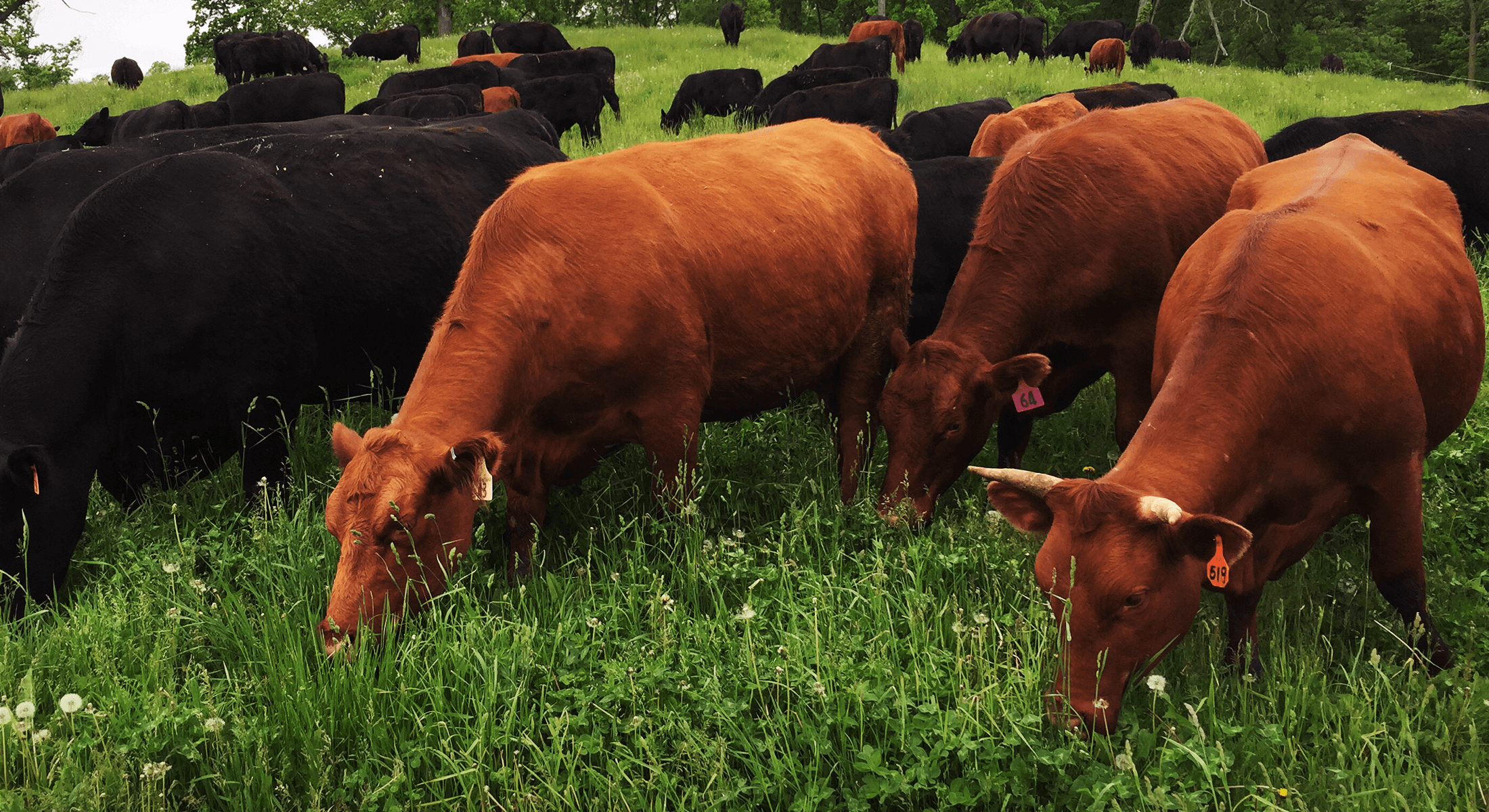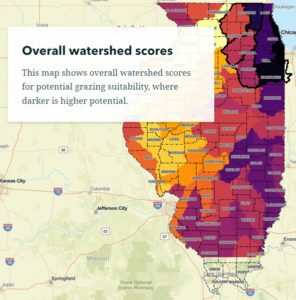
Why Our Work is Needed
Transitioning to a more regenerative agricultural system represents substantial economic and environmental benefit for both Illinois and the broader Midwest as independent, regional producers look beyond conventional methods to raise and produce food.
Delta Institute has spent more than three years analyzing the myriad of economic and environmental benefits associated with expanding regenerative grazing and grass-fed production in Illinois to provide a market-driven evolution of farming methodology. Through our work, we have developed a clear picture of grass-fed beef supply and demand in Illinois, establishing a target for additional acres of regenerative grazing needed in the coming years to meet Chicago’s growing grass-fed beef market.
Ultimately, consumers are looking for more local, regenerative, and humanely raised cattle to provide more grass-fed beef options in their stores, restaurants, and dinner table.
Brief Overview of What We’re Doing
Delta Institute and the Pasture Project, an initiative of the Wallace Center at Winrock International have sought to support direct and retail market grass-fed beef production and distribution in the broader Chicago “foodshed.”
Our long-term vision is the creation of a robust local grass-fed marketplace that provides enough market drivers for farmers to adopt or incept regenerative farming methodology in the greater foodshed, while providing Chicago consumers with high quality, local, regeneratively produced grass-fed beef.
Short-term, our goal is to stabilize and expand regenerative grazing operations in the watersheds by building value-chain momentum and capacity through direct market and retail market optimization for grass-fed beef in the greater Chicago area through concrete actionable recommendations and tools that facilitate transition to regenerative grazing by reducing barriers to entry.
Key Resources and Materials
Please review and use our many tools, recommendations, and analysis that Delta Institute and our partners have authored since the project’s start in 2019; these items are also available on our Publications Roster.
Grass-Fed Beef Procurement Analysis | Click to Expand
This report presents potential interventions to be applied by stakeholders at various points in the procurement process including production, aggregation, processing/distribution, food service, and actions taken at the institutional level. Read more about our findings here: Grass-fed Beef Institutional Procurement Analysis
Recommended Interventions for Grass-Fed Beef Production | Click to Expand
This memo describes analysis to identify key businesses currently associated with beef production and value-chains in or connected to the priority watersheds, with an emphasis on grazing and grass-fed beef production. It includes recommended interventions for the transition of production and value chain development, as informed by stakeholders. Read more here: Grass-Fed Beef Production Interventions
Regenerative Grazing Transition Analysis of Upper Fox and Kishwaukee Watersheds | Click to Expand
This memo describes analysis and recommendations to advance transitions to regenerative grazing and grass-fed beef production in priority watersheds. The analysis focuses on transition of cropland to permanent perennial pasture, since perennialization of the landscape is shown to have the highest water quality, carbon, and infiltration impacts. Read more: Regenerative-Grazing-Transition-Analysis
Priority Watershed Selection for Expanding Regenerative Grazing in the Chicago Foodshed | Click to Expand
This memo describes the rationale for selecting a watershed(s) for deepening place-based engagement in the greater Chicago area. Three components for assessing watershed suitability for regenerative grazing and grass-fed beef production were explored: mapping analysis of 14 spatial datasets, stakeholder feedback, and outreach/engagement of regional experts. Watersheds were ranked and prioritized for further stakeholder engagement. Read more here: Priority-Watershed-Selection-for-Expanding-Regenerative-Grazing
CoOp Retail Grass-Fed Beef Brief | Click to Expand
Consumers want more direct, local food options, and view grass-fed beef as a healthier, higher quality and more humane meat option, according to our user research. This brief explores expanding grass-fed beef options and vendors within Community Supported Agriculture (CSAs), Co-Ops, Farm Stands, and other retail outlets. Read more here.
Farmers Markets Grass-Fed Beef Brief | Click to Expand
Consumers want more direct, local food options, and view grass-fed beef as a healthier, higher quality and more humane meat option, according to our user research. This brief explores expanding grass-fed beef options and vendors at Farmers Markets throughout the Chicago Metropolitan Statistical Area (MSA). Read more here.
Restaurant Grass-Fed Beef Brief | Click to Expand
Consumers want more direct, local food options, and view grass-fed beef as a healthier, higher quality and more humane meat option, according to our user research. This brief explores expanding grass-fed beef options and vendors at restaurants throughout the Chicago Metropolitan Statistical Area (MSA). Read more here.
Specialty Retail Grass-Fed Beef Brief | Click to Expand
Consumers want more direct, local food options, and view grass-fed beef as a healthier, higher quality and more humane meat option, according to our user research. This brief explores expanding grass-fed beef options at specialty grocers and butchers throughout the Chicago Metropolitan Statistical Area (MSA). Read more here.
Interactive Illinois Watershed StoryMap | Click to Visit

Partners
Delta Institute would like to extend our appreciation to the Pasture Project at Winrock International, and the many farmers, restaurant owners, farmers markets, and other collaborators whose acumen and knowledge have assisted us in our market development and analysis efforts.
Funding
Generous long-term support for this project was provided through Food:Land:Opportunity, an initiative of Kinship Foundation and The Chicago Community Trust, funded through the Searle Funds at The Chicago Community Trust.

